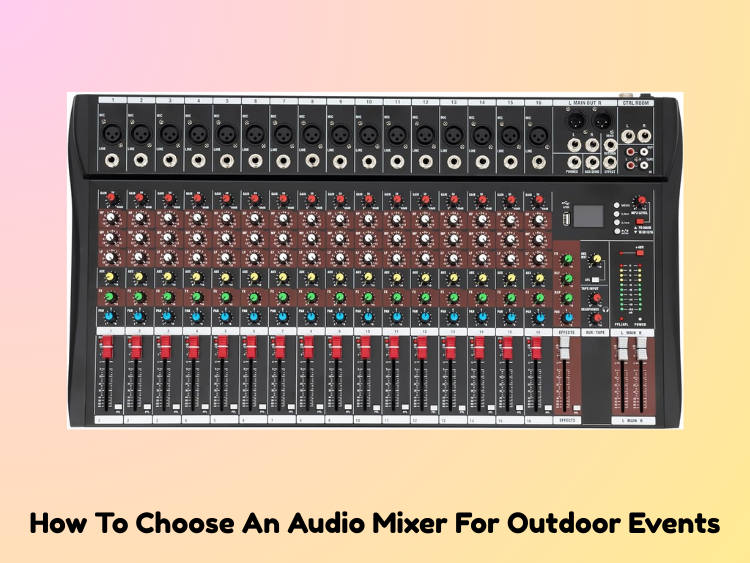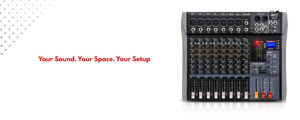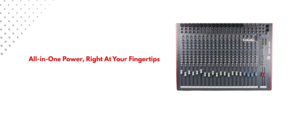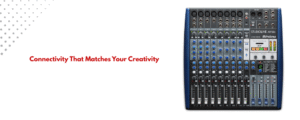Sound problems are different at outdoor events because of things like wind noise, background noise, and big, open areas that change how sound moves. Picking the right audio mixer ensures the sound is clear and balanced at a live show, wedding, community fair, or business event. With this guide, you’ll know what to look for in an audio mixer that you can use outside.
Determine Your Setup Needs
Think about what your event needs before you choose a outdoor audio mixer:
- Number of inputs: How many mics, instruments, or audio devices will you use? You’ll probably need at least 8–16 channels if you have a band. Four to six stations might be enough for music and talks.
- Speaker setup: Consider how many speakers, monitors, or subwoofers you will attach. To cover a bigger area, outdoor events often need more speakers than indoor ones. If you’re new to setting this up, this live sound engineer’s overview can give you a better understanding of how audio flows in open environments.
If you pick a outdoor audio mixer with too few channels, you might not be able to do as much. It’s always better to have a little extra than not enough.
Choose Portability and Durability
A lot of the time, moving and putting up equipment on-site is part of outdoor events. These are things you should look for in a best live sound mixer:
- It should be small and light, especially if you’ll move gear alone or with a small group.
- Rugged or ready for the road, with a strong frame that can handle small bumps, dust, and changing weather.
Tip: Most mixers aren’t waterproof—so invest in a durable tent or case. If you’re planning to stream the event or capture sound digitally, here are some tips for connecting your mixer to a PC.
Opt for a Mixer with Built-In Effects and EQ
Sound shaping equipment is important outdoors, where acoustics are less predictable.
- Vocals and instruments can sound better with built-in echo or delay.
- The built-in EQ (both per channel and master) lets you cut out strong sounds or make things clearer. It’s best to have three or four bands of EQ on each channel.
- At open-air events with many mics, feedback reduction or anti-feedback settings are very helpful.
These features simplify your setup and reduce the need for external gear. For live streams or real-time output, these also help ensure quality. Need help balancing your mix on-the-go? Check out these mixing tips for live streaming.
Analog vs. Digital Mixers
- Analog mixers are usually easier to use and less expensive. They work great for small to medium-sized outdoor events where you need to handle things quickly and easily.
- With a digital mixer, you can save your presets, control them remotely with an app, record them directly, and get more detailed EQ and route choices.
A digital mixer is useful if you’re in charge of big events or want to remember settings. To do this, ensure you or your team knows how to do it.
Consider Connectivity and Power
Pick the best live sound mixer with power choices that you can trust. Some have built-in battery support or can connect to portable power sources, which is useful when you’re out in the middle of nowhere. If you use condenser mics, ensure your mixer has standby power. If you want to avoid crosstalk, which happens more often with long wire runs outside, look for balanced XLR outlets. Also, see if it has Bluetooth or USB for when you want to use music from your phone or laptop.
Remote Control
Some new mixers can be controlled from a PC or a mobile app. With this tool, you can:
- Change the sound as you move around the room.
- Respond quickly to feedback or sound levels that aren’t level.
- You can make changes in real time without being at the mixer.
This changes everything for outdoor games where the mixed position might not be the best.
Cost and Trustworthiness of the Brand
- Choose well-known names like Mackie, 5Core, Allen & Heath, Yamaha, and Behringer. They provide dependable performance and customer service, which is important for live outdoor events.
- Make a budget with all the extras you’ll need, like stands, cases, wires, and a power backup. To save a few bucks, don’t skimp on quality. It could cost you at the show.
Conclusion
When picking one for outdoor events, it’s important to find a flexible, durable, and easy-to-control PA system mixer. A good mixer not only makes your sound better, but it also makes setting up and making changes live easier and more reliable. You can find a mixer that works for your event by considering the number of audio sources, the size of the event, and the surroundings. This will help you ensure everyone can hear every word and note.




